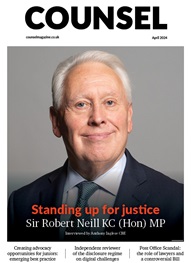*/
The International Committee of the Bar Council is seeking barristers’ chambers willing to offer placements for 12 young Chinese Lawyer for 11 weeks, from 24 January and 15 April 2011 (with the week beginning 31 January off for Chinese New Year).
The lawyers are participants in the Lord Chancellor’s Training Scheme. Before starting their barrister placements they study English legal language, English law and also complete a placement with a solicitors’ firm. The lawyers are aged between 26 and 40, have completed at least two years of legal practice in China (and are often partners in their firms) and have excellent English language skills.
Interested chambers must be in the commercial field (in the broader sense), have demonstrable interest in China, and should be able to offer one or preferably two mentors to guide the Chinese lawyer through their placement. Placements typically consist of:
However, the programme is flexible and should be negotiated between the chambers, mentor and Chinese Lawyer at the beginning of the placement to ensure that all parties have their interests addressed.
If you wish to express your interest in participating in the programme, or would like to learn more about the programme or the role of the mentor please contact Sarah Richardson, International Projects Office, at srichardson@barcouncil.org.uk, or 020 7611 1316.
The lawyers are participants in the Lord Chancellor’s Training Scheme. Before starting their barrister placements they study English legal language, English law and also complete a placement with a solicitors’ firm. The lawyers are aged between 26 and 40, have completed at least two years of legal practice in China (and are often partners in their firms) and have excellent English language skills.
Interested chambers must be in the commercial field (in the broader sense), have demonstrable interest in China, and should be able to offer one or preferably two mentors to guide the Chinese lawyer through their placement. Placements typically consist of:
However, the programme is flexible and should be negotiated between the chambers, mentor and Chinese Lawyer at the beginning of the placement to ensure that all parties have their interests addressed.
If you wish to express your interest in participating in the programme, or would like to learn more about the programme or the role of the mentor please contact Sarah Richardson, International Projects Office, at srichardson@barcouncil.org.uk, or 020 7611 1316.
The International Committee of the Bar Council is seeking barristers’ chambers willing to offer placements for 12 young Chinese Lawyer for 11 weeks, from 24 January and 15 April 2011 (with the week beginning 31 January off for Chinese New Year).


Sam Townend KC explains the Bar Council’s efforts towards ensuring a bright future for the profession
Giovanni D’Avola explores the issue of over-citation of unreported cases and the ‘added value’ elements of a law report
Louise Crush explores the key points and opportunities for tax efficiency
Westgate Wealth Management Ltd is a Partner Practice of FTSE 100 company St. James’s Place – one of the top UK Wealth Management firms. We offer a holistic service of distinct quality, integrity, and excellence with the aim to build a professional and valuable relationship with our clients, helping to provide them with security now, prosperity in the future and the highest standard of service in all of our dealings.
Is now the time to review your financial position, having reached a career milestone? asks Louise Crush
If you were to host a dinner party with 10 guests, and you asked them to explain what financial planning is and how it differs to financial advice, you’d receive 10 different answers. The variety of answers highlights the ongoing need to clarify and promote the value of financial planning.
Most of us like to think we would risk our career in order to meet our ethical obligations, so why have so many lawyers failed to hold the line? asks Flora Page
If your current practice environment is bringing you down, seek a new one. However daunting the change, it will be worth it, says Anon Barrister
One year on and the Court of Appeal fails to quash convictions after receiving evidence of racism in the jury room, and there are still no revisions to the Equal Treatment Bench Book , says Keir Monteith KC
A cultural life and times
In a new video-podcast series, Frances Gibb asks some of the most senior former judges about their time in office, their key decisions and dealings with ministers